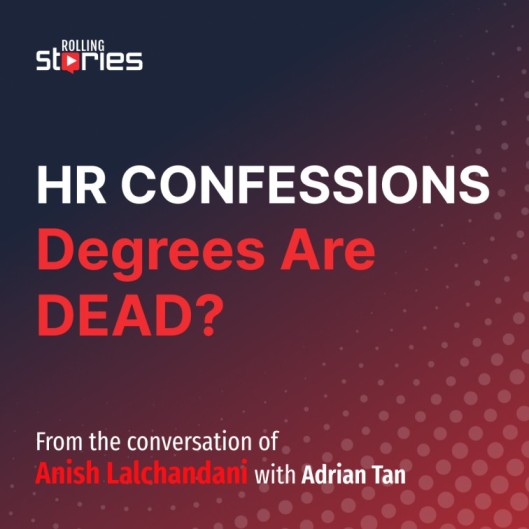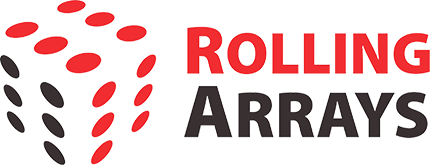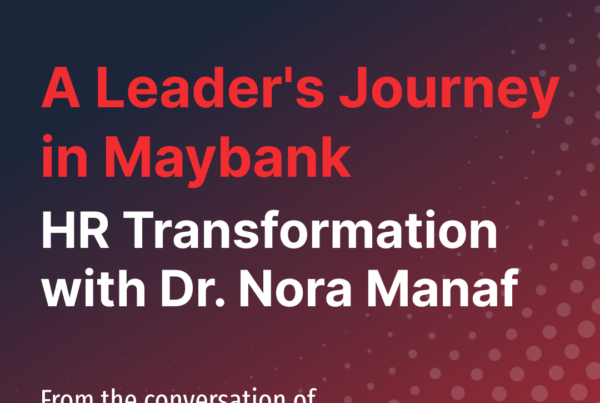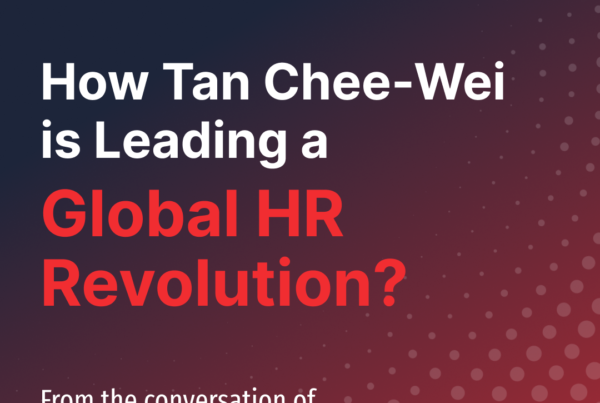
Degrees Are Dead? The Skills Advantage and the Future of Work with Anish Lalchandani
In the latest episode of Rolling Stories Season 5, hosts Adrian Tan and Manu Khetan sat down with Anish Lalchandani, Global Head of Talent Management at AP Moller Maersk and author of The Skills Advantage, to explore one of the most pressing debates shaping the workforce today — degrees versus real-world skills.
With decades of global HR experience and a front-row seat to the evolving world of talent, Anish shared powerful insights on why traditional education models are losing relevance, how AI is reshaping HR, and what organizations must do to build a truly skills-first workforce.
The Decline of Degrees and the Rise of Skills
Anish began with a bold statement that set the tone for the conversation — the world of work has outgrown the traditional degree.
“For decades, a degree was the golden ticket to a career. Today, it’s just one of many indicators — and not necessarily the most important one,” he noted.
He emphasized that as technology and business models evolve rapidly, skills, adaptability, and curiosity are becoming far stronger predictors of success than formal qualifications. Organizations that cling to degree-based hiring risk missing out on exceptional talent that may come from unconventional backgrounds.
This shift calls for a new lens in HR — one that values capabilities over credentials.
From Reskilling to Lifelong Learning
One of the key themes of the discussion was the difference between reskilling and upskilling, and why both are crucial yet insufficient on their own.
According to Anish, “Reskilling cannot be treated as a one-time intervention. It has to be a continuous mindset — a lifelong process of staying curious and adaptable.”
He highlighted how leading organizations are moving away from traditional training programs toward ecosystem-based learning models, where employees continuously evolve alongside the business. This involves integrating learning into work, fostering cross-functional exposure, and encouraging self-driven development.
The takeaway: Reskilling is not a project; it’s a culture.
AI and the Human Element in HR
While artificial intelligence is transforming talent management, Anish warned against viewing it purely as a tool for automation.
“AI can drive incredible efficiency,” he said, “but without a human-centered approach, it risks dehumanizing HR.”
He urged HR leaders to find balance — using AI for data-driven decision-making, predictive analytics, and talent forecasting, but ensuring that empathy, fairness, and ethics remain at the core of every process.
The goal, he explained, should be “efficiency with empathy” — where AI supports human judgment, not replaces it.
Building a Skills Ecosystem
A recurring message in Anish’s insights was the need for organizations to adopt a skills ecosystem mindset — one that connects business strategy, workforce planning, and individual growth into a unified framework.
This means mapping out critical skills, linking them to job families, and designing development pathways that are dynamic and data-informed.
Anish emphasized that this is not just an HR initiative but a strategic business imperative. Companies that proactively build such ecosystems are better positioned to respond to disruption, retain top performers, and cultivate high-performing, future-ready teams.
The Ethics of AI and Education
Another fascinating dimension of the discussion was the ethical use of AI — both in workforce management and education.
Anish pointed out that while AI tools can democratize access to learning and hiring opportunities, they can also perpetuate bias if not governed responsibly.
He called for clear frameworks that ensure fairness, transparency, and inclusivity — principles that should guide both HR and education systems in an AI-driven world.
Why This Episode Matters
For HR leaders, learning professionals, and business strategists, this episode is more than a discussion about technology or education — it’s a wake-up call.
Anish Lalchandani’s perspective challenges the long-held assumptions that degrees define competence. Instead, he advocates for a skills-first philosophy rooted in curiosity, adaptability, and purpose-driven learning.
As organizations navigate the complexities of AI, digital transformation, and changing workforce dynamics, this episode of Rolling Stories delivers a clear message: the future belongs to those who learn, unlearn, and relearn — not just those who have a degree.
Watch the full episode: Degrees Are Dead? The Brutal Truth About HR, Skills, and AI with Anish Lalchandani
(Available now on YouTube, Spotify, and Apple Podcasts )
Recent Podcast
June 24, 2025
About Rolling Arrays
Rolling Arrays has been driving SAP SuccessFactors-led HR Transformation since 2009. The company specialises in SF consulting, implementation, and support and also builds applications to enhance the utility of the SuccessFactors platform. It is committed to designing systems that help its customers to attract, develop and retain talented individuals. In 2021, Rolling Arrays was recognized as one of the top 75 fastest-growing companies in Singapore by The Straits Times & Statista.







